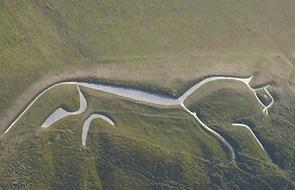
Is Man right to leave his mark upon Nature? The decision we make there will defines how we see Humanity, how we treat our fellow Human beings, how we see our place on this planet and our purpose thereon. If we are environmentalists rather than humanists, our view of the Good will be radically different from what it would be otherwise, and from that position we might well hate Modernity, wish for nothing better than its destruction, and for the return of Man to a state of nature as a simple peasant. We might even support the ecological platform without realizing it, simply following naively the plan set by others whose hearts are not so pure as our own. In our attempt to save chickens and bunnies and trees and whales we might find we've fallen into some unpleasant traps. We have to sacrifice to make life: we sacrifice nature for man or man for nature. There might seem to be a middle ground, but no, there is not. Man is supreme or man is not.
This is the final installment of Peter Staudenmaier's excellent essay on Green Fascism.
***

Fascist Ecology in Context
To make this dismaying and discomforting analysis more palatable, it is tempting to draw precisely the wrong conclusion --namely, that even the most reprehensible political undertakings sometimes produce laudable results. But the real lesson here is just the opposite: Even the most laudable of causes can be perverted and instrumentalized in the service of criminal savagery. The "green wing" of the NSDAP was not a group of innocents, confused and manipulated idealists, or reformers from within; they were conscious promoters and executors of a vile program explicitly dedicated to inhuman racist violence, massive political repression and worldwide military domination. Their 'ecological' involvements, far from offsetting these fundamental commitments, deepened and radicalized them. In the end, their configuration of environmental politics was directly and substantially responsible for organized mass murder.
No aspect of the Nazi project can be properly understood without examining its implication in the holocaust. Here, too, ecological arguments played a crucially malevolent role. Not only did the "green wing" refurbish the sanguine antisemitism of traditional reactionary ecology; it catalyzed a whole new outburst of lurid racist fantasies of organic inviolability and political revenge. The confluence of anti-humanist dogma with a fetishization of natural 'purity' provided not merely a rationale but an incentive for the Third Reich's most heinous crimes. Its insidious appeal unleashed murderous energies previously untapped. Finally, the displacement of any social analysis of environmental destruction in favor of mystical ecology served as an integral component in the preparation of the final solution:
To explain the destruction of the countryside and environmental damage, without questioning the German people's bond to nature, could only be done by not analysing environmental damage in a societal context and by refusing to understand them as an expression of conflicting social interests. Had this been done, it would have led to criticism of National Socialism itself since that was not immune to such forces. One solution was to associate such environmental problems with the destructive influence of other races. National Socialism could then be seen to strive for the elimination of other races in order to allow the German people's innate understanding and feeling of nature to assert itself, hence securing a harmonic life close to nature for the future.64This is the true legacy of ecofascism in power: "genocide developed into a necessity under the cloak of environment protection." 65
The experience of the "green wing" of German fascism is a sobering reminder of the political volatility of ecology. It certainly does not indicate any inherent or inevitable connection between ecological issues and right-wing politics; alongside the reactionary tradition surveyed here, there has always been an equally vital heritage of left-libertarian ecology, in Germany as elsewhere.66 But certain patterns can be discerned: "While concerns about problems posed by humankind's increasing mastery over nature have increasingly been shared by ever larger groups of people embracing a plethora of ideologies, the most consistent 'pro-natural order' response found political embodiment on the radical right."67 This is the common thread which unites merely conservative or even supposedly apolitical manifestations of environmentalism with the straightforwardly fascist variety.
The historical record does, to be sure, belie the vacuous claim that "those who want to reform society according to nature are neither left nor right but ecologically minded."68 Environmental themes can be mobilized from the left or from the right, indeed they require an explicit social context if they are to have any political valence whatsoever. "Ecology" alone does not prescribe a politics; it must be interpreted, mediated through some theory of society in order to acquire political meaning. Failure to heed this mediated interrelationship between the social and the ecological is the hallmark of reactionary ecology.
 As noted above, this failure most commonly takes the form of a call to "reform society according to nature," that is, to formulate some version of 'natural order' or 'natural law' and submit human needs and actions to it. As a consequence, the underlying social processes and societal structures which constitute and shape people's relations with their environment are left unexamined. Such willful ignorance, in turn, obscures the ways in which all conceptions of nature are themselves socially produced, and leaves power structures unquestioned while simultaneously providing them with apparently 'naturally ordained' status. Thus the substitution of ecomysticism for clear-sighted social-ecological inquiry has catastrophic political repercussions, as the complexity of the society-nature dialectic is collapsed into a purified Oneness. An ideologically charged 'natural order' does not leave room for compromise; its claims are absolute.
As noted above, this failure most commonly takes the form of a call to "reform society according to nature," that is, to formulate some version of 'natural order' or 'natural law' and submit human needs and actions to it. As a consequence, the underlying social processes and societal structures which constitute and shape people's relations with their environment are left unexamined. Such willful ignorance, in turn, obscures the ways in which all conceptions of nature are themselves socially produced, and leaves power structures unquestioned while simultaneously providing them with apparently 'naturally ordained' status. Thus the substitution of ecomysticism for clear-sighted social-ecological inquiry has catastrophic political repercussions, as the complexity of the society-nature dialectic is collapsed into a purified Oneness. An ideologically charged 'natural order' does not leave room for compromise; its claims are absolute.
For all of these reasons, the slogan advanced by many contemporary Greens, "We are neither right nor left but up front," is historically naive and politically fatal. The necessary project of creating an emancipatory ecological politics demands an acute awareness and understanding of the legacy of classical ecofascism and its conceptual continuities with present-day environmental discourse. An 'ecological' orientation alone, outside of a critical social framework, is dangerously unstable. The record of fascist ecology shows that under the right conditions such an orientation can quickly lead to barbarism.
http://www.spunk.org/library
***
This is the last part of our look at ecology until we return to look at Heidegger at some point in the future. The point of it all has been to bring to our awareness that we in the West are pulling in tow directions against ourselves. We think we should cherish the natural, but we live in an unnatural environment. We sometimes sentimentalise nature without realizing that when we do we devalue Humanity.
Ecology comes in two varieties: prudential and ideological. The confusion in the public mind between these two approaches leads some to commit themselves to our destruction as the modern West. We find oursevles supporting murderers, for example, who seem to be living the very lifestyles we claim as ecologists to support. We support tolerance of Islam against the perceived evils of industrial and technological capitalist Modernity. We must examine the assumptions that lead us to support both ecologically sound practices and also require us to support those who live in a state of nature. The two are not the same, as we hope to God the reader has understood by now.



No comments:
Post a Comment